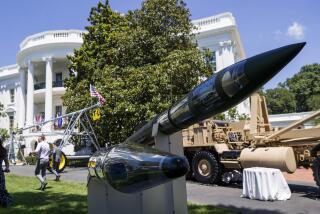As U.S. prepares to leave Iraq, Iran’s shadow looms large
- Share via
Reporting from Tampa, Fla. — As the last U.S. troops pack up to leave Iraq by the end of next month, Pentagon officials and senior military commanders are warning that Iran will rush to fill a power vacuum created by the American exit unless Washington limits its pullback from the region.
That broad assessment has taken on urgency in recent weeks against a backdrop of new intelligence that indicates the government in Tehran also is aggressively courting proxy forces in Yemen and, according to United Nations nuclear inspectors, is fast approaching the capability to build nuclear weapons.
U.S. intelligence officials say Iranian operatives have provided millions of dollars to leaders of the Houthi tribe, which adheres to an offshoot of Shiite Islam in Yemen’s rugged north and has joined an armed uprising by disparate forces against the U.S.-backed government in Sana.
In Iraq and other trouble spots, Iran is handing out money and weapons, often in secret, in an effort to expand its clout and stay ahead of the political changes sweeping the region since the start of the “Arab Spring,” U.S. officials say.
The Islamic Republic still faces severe challenges, however. If opposition forces in Syria manage to topple President Bashar Assad, Iran could lose its closest ally in the region.
By emphasizing the Iranian threat, U.S. commanders and Pentagon officials are hoping to gain support at the White House and in the capitals of regional allies for a more concerted focus on containing Iran’s growing influence, including shifting some U.S. military forces leaving Iraq to other bases in the Persian Gulf.
“Why in the world would we abdicate presence and stability in the [region] to a malign Iran?” Army Maj. Gen. Karl R. Horst, chief of staff at U.S. Central Command, asked in an interview. “I’m just not sure those are good outcomes, from the U.S. perspective.”
Central Command, headquartered at MacDill Air Force Base in Tampa, has drawn up plans to station several battalions or a brigade of ground troops in Kuwait. A battalion has 700 to 900 troops. A brigade has 3,500 to 5,000.
The plan has not been approved by President Obama, and Sheik Jabbar Mubarak al Sabah, Kuwait’s defense minister, said last week that there were no immediate plans to increase American troops levels.
After the 1991 Persian Gulf War to push Iraqi troops out of Kuwait, the U.S. had kept a combat battalion there to deter further aggression by Saddam Hussein. Several thousand U.S. logistics personnel then stayed after the U.S.-led 2003 invasion of Iraq, and Kuwait became a major staging ground for supplies and units heading into the war.
Central Command’s proposal to again station combat units in Kuwait is aimed primarily at deterring Iran and making U.S. troops readily available in case of a crisis, senior officers said.
The command also is making plans to increase the U.S. naval presence in the Persian Gulf, to step up arms sales to allies in the gulf and to undertake additional military exercises with allies in the region, officials said.
These moves represent the Pentagon’s fallback plan after the White House and Iraq broke off talks on keeping several thousand U.S. combat troops in the country after December, the deadline set in 2008 for all American forces to leave. Obama is expected to agree to most, if not all, of the proposed moves.
But White House officials are nervous about appearing to undertake another military buildup after a decade of war. The administration has stressed that it intends to press for a diplomatic approach to constraining Iran, not a military confrontation.
At the same time, the U.S. military exit from Iraq is hardly a clear victory for Iran. For instance, the Shiite militants and other insurgents who have attacked U.S. forces in Iraq for years — often with weapons and supplies from Iran — are losing their main enemy. That will probably reduce their dependence on Tehran.
The administration also is looking to stiffen trade and travel sanctions against Iran in response to what the White House said was an Iranian plot to assassinate the Saudi ambassador at a restaurant in Washington, and the International Atomic Energy Agency report last week on advances in Iran’s nuclear program.
U.S. commanders initially had recommended keeping more than 20,000 U.S. troops in Iraq after this year to train its army and police. Supporters also argued that the force would help provide a bulwark against Iran’s effort to build influence over Iraq’s Shiite-dominated government.
The question now, military officials say, is whether the Obama administration can maintain leverage with Iraqi Prime Minister Nouri Maliki’s government after all U.S. troops depart, or whether Iran will gain greater sway.
“The withdrawal of U.S. forces creates a vacuum, and somebody has to fill that vacuum,” a senior military intelligence official said. “Iran’s full focus now will be on trying to consolidate their influence as much as they possibly can.”
More to Read
Sign up for Essential California
The most important California stories and recommendations in your inbox every morning.
You may occasionally receive promotional content from the Los Angeles Times.











